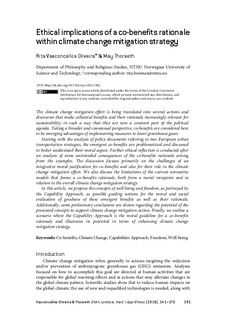| dc.contributor.author | Oliveira, Rita Vasconcellos | |
| dc.contributor.author | Thorseth, May Britt | |
| dc.date.accessioned | 2017-01-27T14:18:25Z | |
| dc.date.available | 2017-01-27T14:18:25Z | |
| dc.date.created | 2016-11-16T17:41:09Z | |
| dc.date.issued | 2016 | |
| dc.identifier.citation | Etikk i praksis. 2016, 10 (2), 141-170. | nb_NO |
| dc.identifier.issn | 1890-3991 | |
| dc.identifier.uri | http://hdl.handle.net/11250/2428797 | |
| dc.description.abstract | Climate change mitigation effort is being translated into several actions and discourses that make collateral benefits and their rationale increasingly relevant for sustainability, in such a way that they are now a constant part of the political agenda. Taking a border and consensual perspective, co-benefits are considered here to be emerging advantages of the implementation of measures regarding the lowering of greenhouse gases.
Departing from the analysis of policy documents referring to two European urban transportation strategies, the emergent co-benefits are problematized and discussed to better understand their moral aspect. Further ethical reflection is conducted after an analysis of some unintended consequences of co-benefits rationale coming from the mentioned examples. The focus is primarily on the challenges of an integrative moral justification for co-benefits and also for their role in the climate change mitigation effort. We also discuss the limitations of the current normative models that frame co-benefits rationale, from a moral viewpoint and in relation to the overall climate change mitigation strategy.
In this article, we propose the concepts of well-being and freedom, as portrayed by Capabilities Approach, as possible guiding notions for the moral and social evaluation of goodness of these emergent benefits and their rationale too. Additionally, some preliminary conclusions are drawn regarding the potential of the presented concepts to favour the climate change mitigation action. Finally, a scenario is drawn where Capabilities Approach is the moral guideline for co-benefits rationale showing this way its potential in terms of enhancing climate change mitigation strategy. | nb_NO |
| dc.language.iso | eng | nb_NO |
| dc.publisher | NTNU Open Access Journals | nb_NO |
| dc.rights | Navngivelse 4.0 Internasjonal | * |
| dc.rights.uri | http://creativecommons.org/licenses/by/4.0/deed.no | * |
| dc.title | Ethical implications of a co-benefits rationale within climate change mitigation strategy | nb_NO |
| dc.type | Journal article | nb_NO |
| dc.type | Peer reviewed | nb_NO |
| dc.source.pagenumber | 141-170 | nb_NO |
| dc.source.volume | 10 | nb_NO |
| dc.source.journal | Etikk i praksis | nb_NO |
| dc.source.issue | 2 | nb_NO |
| dc.identifier.doi | 10.5324/eip.v10i2.1942 | |
| dc.identifier.cristin | 1401145 | |
| dc.description.localcode | This is an open access article distributed under the terms of the Creative Commons Attribution 4.0 International License , which permits unrestricted use, distribution, and reproduction in any medium, provided the original author and source are credited. | nb_NO |
| cristin.unitcode | 194,62,70,0 | |
| cristin.unitname | Institutt for filosofi og religionsvitenskap | |
| cristin.ispublished | true | |
| cristin.fulltext | original | |
| cristin.qualitycode | 1 | |

